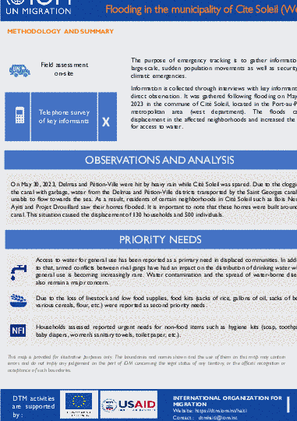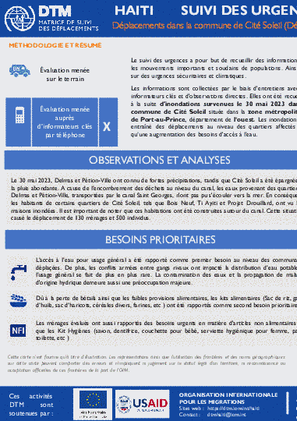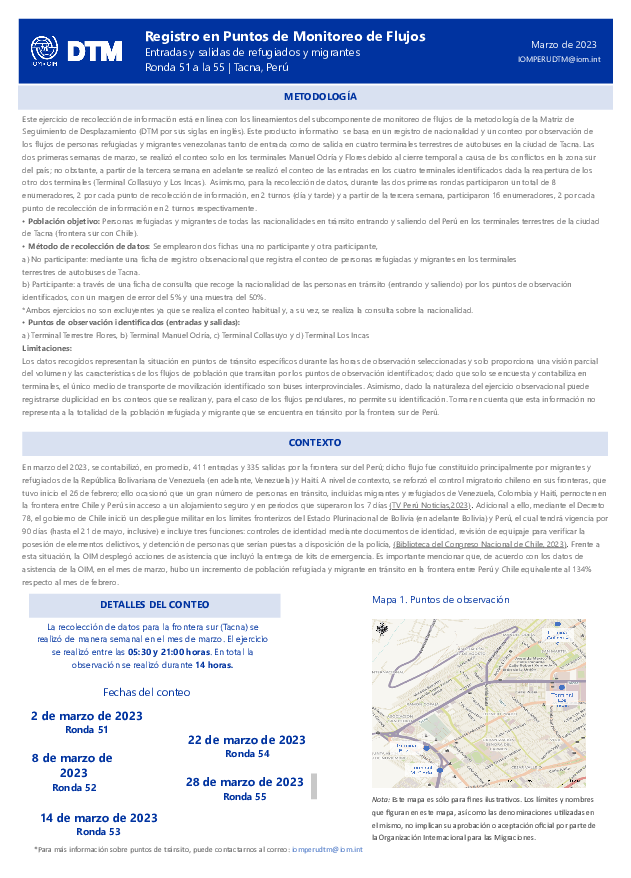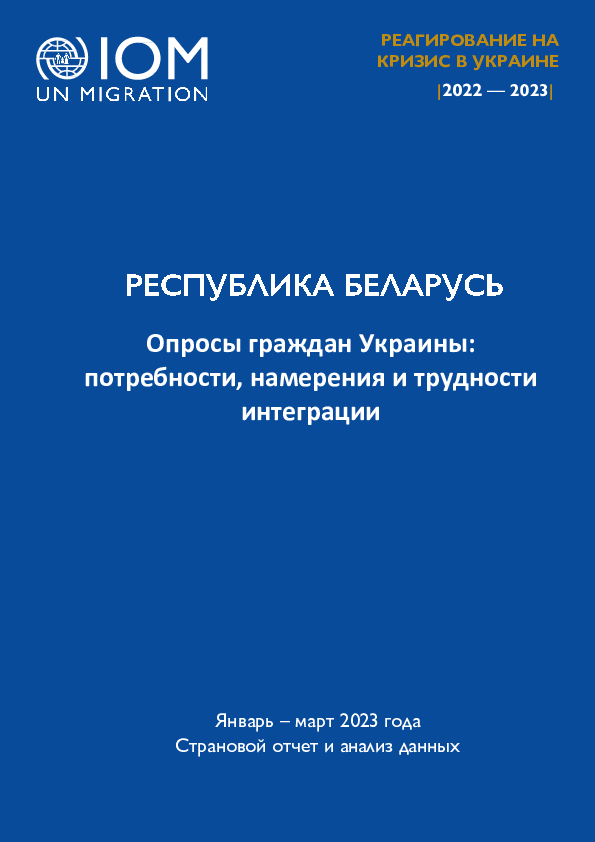-
Countries
-
Data and Analysis
-
Special Focus
-
Crisis Responses

Contact
dtmhaiti@iom.int
Language
English
Location
Haiti
Period Covered
May 01 2023
May 30 2023
Activity
- Mobility Tracking
- Event Tracking
The purpose of emergency tracking is to gather information on large-scale, sudden population movements as well as security and
climatic emergencies. Information is collected through interviews with key informants and direct observation. It was gathered following flooding on May 30th 2023 in the commune of Cité Soleil, located in the Port-au-Prince metropolitan area (west department). The floods caused displacement in the affected neighborhoods and increased the need for access to water.

Contact
dtmhaiti@iom.int
Language
English
Location
Haiti
Period Covered
May 01 2023
May 30 2023
Activity
- Mobility Tracking
- Event Tracking
Le suivi des urgences a pour but de recueillir des informations sur les mouvements importants et soudains de populations. Ainsi que sur des urgences sécuritaires et climatiques. Les informations sont collectées par le biais d'entretiens avec des informateurs clés et d'observations directes. Elles ont été recueillies à la suite d'inondations survenues le 30 mai 2023 dans la commune de Cité Soleil située dans la zone métropolitaine de Port-au-Prince, département de l’ouest. Les inondations ont entraîné des déplacements au niveau des quartiers affectés ainsi qu’une augmentation des besoins d'accès à l’eau.

Contact
DTM Peru, IOMDTMPeru@iom.int
Language
Spanish
Location
Peru
Period Covered
Mar 01 2023
Mar 31 2023
Activity
- Flow Monitoring
Este ejercicio de recolección de información está en línea con los lineamientos del subcomponente de monitoreo de flujos de la metodología de la Matriz de Seguimiento de Desplazamiento (DTM por sus siglas en inglés). Este producto informativo se basa en un registro de nacionalidad y un conteo por observación de los flujos de personas refugiadas y migrantes venezolanas tanto de entrada como de salida en cuatro terminales terrestres de autobuses en la ciudad de Tacna.
En marzo del 2023, se contabilizó, en promedio, 411 entradas y 335 salidas por la frontera sur del Perú; dicho flujo fue constituido principalmente por migrantes y refugiados de la República Bolivariana de Venezuela (en adelante, Venezuela) y Haití. A nivel de contexto, se reforzó el control migratorio chileno en sus fronteras, que tuvo inicio el 26 de febrero; ello ocasionó que un gran número de personas en tránsito, incluidas migrantes y refugiados de Venezuela, Colombia y Haití, pernocten en la frontera entre Chile y Perú sin acceso a un alojamiento seguro y en periodos que superaron los 7 días (TV Perú Noticias,2023). Adicional a ello, mediante el Decreto 78, el gobierno de Chile inició un despliegue militar en los límites fronterizos del Estado Plurinacional de Bolivia (en adelante Bolivia) y Perú, el cual tendrá vigencia por 90 días (hasta el 21 de mayo, inclusive) e incluye tres funciones: controles de identidad mediante documentos de identidad, revisión de equipaje para verificar la posesión de elementos delictivos, y detención de personas que serían puestas a disposición de la policía, (Biblioteca del Congreso Nacional de Chile, 2023). Frente a esta situación, la OIM desplegó acciones de asistencia que incluyó la entrega de kits de emergencia. Es importante mencionar que, de acuerdo con los datos de asistencia de la OIM, en el mes de marzo, hubo un incremento de población refugiada y migrante en tránsito en la frontera entre Perú y Chile equivalente al 134% respecto al mes de febrero.

Contact
IOMASTANA@iom.int
Language
English
Location
Kazakhstan
Period Covered
Jan 01 2023
Mar 31 2023
Activity
- Survey
- Flow Monitoring Survey
- Flow Monitoring
- Mobility Tracking
Migration Tracking Matrix (MTM) is a system based on the IOMs Global Displacement tracking matrix - DTM, which is aimed at tracking and monitoring displacement and population mobility, providing critical information to decision makers and responders during crises and contributing to a better understanding of migration flows.
- Mixed Migration Flows to Europe
- Migrant Flows Monitoring in the Republic of Türkiye
- First Arrival countries (Italy, Greece, Spain) and other countries of first arrival (Bulgaria, Cyprus and Malta)
- Transits through the Western Balkan region
- Migrants' presence, in Europe and the Republic of Türkiye
Jun 02 2023
Print
Global
No
Jun 02 2023
Print
South Korea
Global
No
Jun 02 2023
Print
Belgium
Global
No

Contact
IOMDTMPoland@iom.int
Language
English
Location
Poland
Period Covered
Apr 25 2023
Apr 27 2023
Activity
- Flow Monitoring
- Mobility Tracking
- Site Assessment
W okresie 25-27 kwietnia zespół DTM w Warszawie przeprowadził 11 dyskusji w grupach fokusowych, w których uczestniczyło łącznie 90 osób, w lokalizacjach zbiorowego zakwaterowania naul. Wołoskiej 7 (A i B), Jana Pawła 15 i Modlińskiej 6D. Celem tego ćwiczenia było zbadanie sytuacji życiowej uchodźców przebywających w lokalizacjach zbiorowego zakwaterowania, ich doświadczeń w znalezieniu zatrudnienia w Polsce, powodów nieprzenoszenia się zmiejsc zbiorowego zakwaterowania i zamiarów na najbliższe miesiące.

Contact
DTM Europe, DTMMediterranean@iom.int
Language
English
Location
Belarus
Period Covered
Jan 01 2023
Mar 31 2023
Activity
- Survey
- Flow Monitoring
- Mobility Tracking
ОСНОВНЫЕ ВЫВОДЫ
- Основные области происхождения респондентов: Донецкая (33%), Луганская (16%) и Харьковская (12%).
- Намерения: не намерены уезжать (62%); желают вернуться в район происхождения в Украине (2%) или в другое место в Украине (0.4%); намерены переехать в другую страну (16%), в основном в Российскую Федерацию, Польшу и Германию; намерены переехать в пределах Беларуси (1.6%).
- Источники для покрытия ежедневных расходов:* поддержка со стороны семьи (50%),
- поддержка со стороны НПО (38%), доход (38%), сбережения (34%).
- Основные потребности:* финансовая поддержка (84%), питание (74%), предметы личной гигиены (64%), медицинское обслуживание (48%), одежда и обувь (44%).
- Основные трудности интеграции:* финансовые вопросы (56%), долгосрочное жилье (11%), подходящая работа (6%), доступ к социальным услугам (3%).
* допускается более одного ответа.
